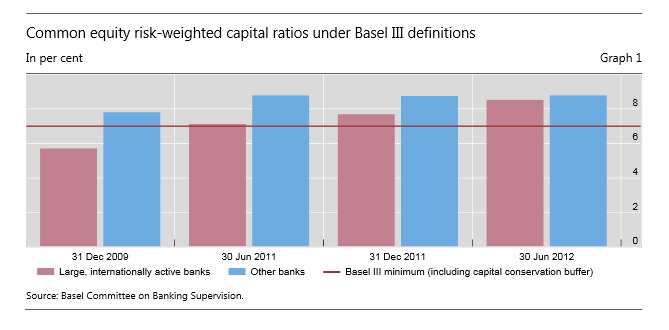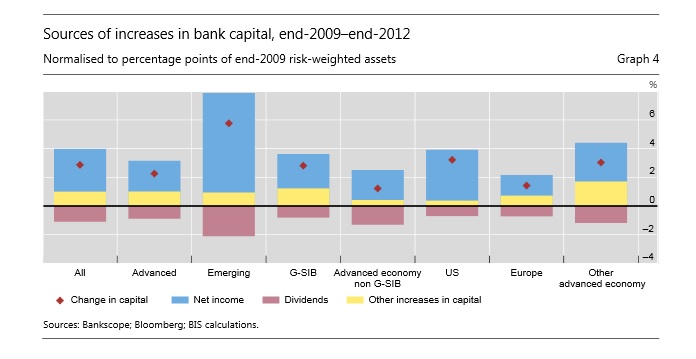A newly issued report by the Bank for International Settlements speaks volumes about what is happening to the world banking system as the new millennium enters its troubled teen years.
I refer to the special feature, “How have banks adjusted to higher capital requirements?” written by Benjamin Cohen and included with the BIS’ latest quarterly review. The gist of the feature is that banks have, “steadily increased their capital ratios since the financial crisis.” Which is good: right? Well, yes and no.
Certainly if you want banks to have healthy-looking balance sheets and never to need rescue you will cheer this development other things being equal.But even with the ‘other things’ clause made explicit, there are three important caveats:
- The ratios in question match equity against assets. Some of these ratios are “risk adjusted,” others are not.
- The significance of the risk adjustment even when the attempt is made is very debatable.
- Finally, none of these ratios has anything to do with actual cash reserves, although from time to time public discussion of the capital ratio issue seems to be proceeding on the assumption that it is a discussion of reserves.
Cohen, a Senior Economist for the BIS, stresses not only that the banks have steadily increased their capital ratios, but that they large internationally active banks have done so in greater measure than have “other banks.” The others are presumably the ones small enough to be allowed to fail anyway.
Boosting Profits
Here we get to the key point. The report contains statements along these lines: “The most direct way to [boost profits] would be by increasing the spread between the interest rates [a given bank] charges for loans and those it pays on its funding.”
Yes, indeed. The best way for a shoe retailer to increase its profits – and potentially its retained earnings as well – is to increase the spread between the price it pays the shoe manufacturer and the price it charges the shoe purchasers who walk in its door. Unfortunately for shoe retailers, they are in a competitive industry where that is easier said than done.
Cohen continues, “While competitive pressures may limit how much an individual bank can widen these spreads, lending spreads could rise across the system if all banks followed a similar strategy….” [Emphasis added.]
If that sounds to you as if the BIS is encouraging the cartelization of the big banks, those internationally-active 2B2F banks especially … it sounds that way to me, as well.
Public Choice Theory
The report seems to me to be an unintended vindication of the “public choice” school in economics, a school whose sages include Elinor Ostrom, James M. Buchanan, and George Stigler.
One of the insights of public choice theorists is that government agencies (within whose ranks we may include, for purposes of this discussion, government-recognized central banks) are generally inclined to cartelize the industries they regulate. This is a point of very general applicability, whether the market is in the transportation of goods (that is, trucking), the retailing of shoes, or the lending of risk capital.
Once the central bankers of the world have decided that some of the banks in their care are too big to fail, the next step is logically and necessarily to protect those banks in particular from even the hint of a threat of failure: to keep them fat and happy, at the expense of the recipients of those loans who, after all, are the ones paying for those bigger spreads.
None of this is good for the real economy but, hey, the public-choice theorists have long warned us it wouldn’t be.
What does this tell us that may be of help to alpha seekers? The report speaks to this point briefly, too. For it says that “alternative funding channels” might “offer more attractive rates” than banks, and that this could threaten the ability of banks to keep their spreads wide even if they refrain from competing with one another.
It mentions the capital markets as an example of non-bank funding. Unfortunately (or fortunately, from the point of view of the cartelizers) that is increasingly blocked these days by the difficulties inherent in going public.
It is surely one of the goals and one of the opportunities of the private equity and venture capital worlds that they continue to offer and constitute non-bank channels of financing that will threaten and over time undermine this cartelization.
Credit where due: It was Felix Salmon’s column on this BIS report that set me on the trail, though his train of inferences therefrom chugs down a track where I do not follow.
